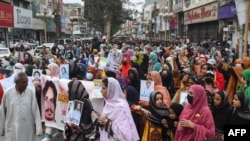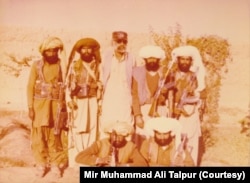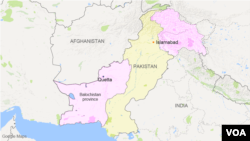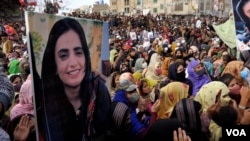“Ever since I was a child, I’ve only seen war,” says Sammi Deen Baloch, a prominent rights activist from Pakistan’s southwestern province. “I am 26 years old and all I can remember are resistance movements in Balochistan, war and military operations. We have never had a normal life.”
Coordinated attacks by Baloch separatists on August 25 killed at least 52 people — 38 civilians and 14 security personnel. Militants stormed police stations, blew up railway tracks, torched vehicles, and killed 23 laborers after identifying them as residents of Punjab province.
The banned Baloch Liberation Army, or BLA, claimed responsibility for the attacks. The military said it killed 21 militants in retaliatory fire.
Violence has escalated across the province in recent years. Experts say decades of mistrust, bad governance and military interventions have widened the gap between the state and the Baloch people and fueled waves of insurgencies that have left resource-rich Balochistan impoverished and perpetually restive.
Accession to Pakistan
Covering almost 44% of Pakistan’s area, the province became part of the country almost a year after the Muslim-majority nation gained independence from Britain in August 1947 in a bloody partition of the Indian subcontinent.
Many Balochs still see themselves as being forced to join Pakistan as the large princely state of Kalat in the Balochistan region initially declared independence.
After the first wave of tribal resistance against Kalat’s annexation in 1948, three more waves followed between 1958 and 1977 as Balochs sought independence or at least greater autonomy.
To assert its control, Islamabad resorted to military action, dismissal of elected provincial governments and arrests of tribal leaders despite promises of amnesty.
“It is a series of aggressions,” Mir Muhammad Ali Talpur, a veteran of the Baloch tribal resistance in the 1970s, told VOA. “That forced the Baloch to resist,” said Talpur, who has written extensively on the province’s issues since returning in the1990s from Afghanistan, where he took refuge with thousands of Baloch tribal fighters.
Fifth insurgency
Balochistan is currently in the throes of a fifth wave of insurgency that erupted in the early 2000s during military leader Pervez Musharraf’s era.
Angered by the rape of a female doctor from Karachi in 2005, allegedly by an army captain in the Sui district, tribesmen from the Bugti clan assaulted military camps.
The killing of popular tribal leader and former chief minister Nawab Akbar Bugti in a 2006 military operation angered Baloch masses and triggered an insurgency that is still raging.
“The killing of Nawab Bugti, that was like the 9-11 of Balochistan,” said Washington-based Baloch political analyst Malik Siraj Akbar, referring to the 2001 terrorist attack on the United States.
Urban appeal
The current violent resistance led by BLA militants is different from past insurgencies, though, according to Islamabad-based security affairs expert Amir Rana.
“BLA leadership is from the middle class, and during the last decade, we have seen the transformation of the leadership of this insurgent movement,” said Rana, who heads the Pakistan Institute of Peace Studies. “This is not anymore tribal. Though there are a few [tribal] leaders in exile … now it is led by middle class, educated youth.”
The banned outfit is also attracting women. BLA claimed one of its suicide bombers in this week’s attack was a female, reportedly a law student at Turbat University in Balochistan. The militant group first used a female suicide bomber — a mother of three — in an April 2022 attack on Chinese nationals in Karachi.
Rana said increased political awareness has also amplified the sense of deprivation among educated urban youth, pushing them into BLA’s orbit. “Baloch youth got exposure to other parts of the country [through government scholarships], and then they realized how backward their province is.”
Human rights abuses have also fueled the insurgency, analysts say. Decades of violent resistance and military action to quash it have left a trail of brutalized bodies on roadsides and families awaiting information about missing loved ones.
BLA is “able to recruit enough young people to sustain their movement because of [the] perception of the Pakistani government, the military, not being sincere in resolving the issue of disappearances and other problems that the Baloch people face,” analyst Akbar explained.
In a 2023 report, the independent Human Rights Commission of Pakistan noted “with concern the state’s widespread use of enforced disappearances to muzzle dissent.”
Addressing a press conference last May, the Pakistani military’s spokesperson, Lieutenant General Arshad Sharif Chaudhry, said the issue of missing persons was complex and exaggerated for propaganda purposes as some of those presumed missing were killed in encounters with the military or are hiding in Afghanistan.
“You put the same people on the missing persons list and accuse law enforcement agencies of abducting them,” Chaudhry said. “For any genuine cases, all agencies, law enforcement authorities and civil institutions give their input, and nobody rests easy until it’s resolved.”
Development dilemma
After BLA’s brazen attacks this week, the provincial government announced plans to equip 30,000 young Balochs with technical job skills to counter what Balochistan’s chief minister, Sarfraz Bugti, called the alienation of Baloch youth.
Despite promises of prosperity and millions of dollars doled out over decades by provincial and federal governments for infrastructure, education and skill development programs, the sparsely populated province remains poverty-ridden and severely underdeveloped.
“The simple answer is corruption. Nothing else,” said Rana.
The arrival of international mega-projects to tap into the province’s natural resources has further stirred suspicion. Along with funding a deep-sea port and a new airport in Gwadar, Chinese companies run gold, copper and silver mining projects in Saindak and zinc and lead mining in Duddar. Canadian company Barrick Gold mines one of the world’s largest copper and gold deposits in Baluchistan’s Reko Diq region.
Many feel exploited by the lack of robust public debate over contracts, access to mostly low-paying jobs and security restrictions affecting mobility and livelihood.
Rights activists have staged massive protests in the heart of Gwadar, while militants have targeted migrant labor and Chinese interests in and outside Balochistan.
Insurgents, Talpur said, think that “those who are working for the government over here, that is settlers or civilians, are part of an oppressive set-up. Same with the Chinese being attacked as well.”
Political vacuum
“There is a gap [of leadership] that neither the nationalists are filling nor the politicians that keep changing political parties,” said Shahzada Zulfiqar, a veteran journalist and political commentator based in Quetta, the provincial capital.
Political analysts and activists who spoke to VOA say many in Balochistan are disillusioned with the democratic process because of the Pakistani state’s alliance with Baloch tribal elders seen as pliant, distrust of popular nationalist politicians, and alleged manipulation of political allegiances.
The Baloch Unity Committee, or BYC, a nonviolent, civic movement, is now trying to fill that political gap, Zulfiqar said.
Led by a young medical doctor, Mahrang Baloch, the BYC started as a protest movement to draw attention to the issue of enforced disappearances. It has since evolved into a broad civic rights movement with massive support.
“If the state engages constructively with Mahrang and accepts some of the movement’s demands, it will put pressure on BLA and lessen its appeal,” said Rana. “This will benefit the state.”
However, authorities have cracked down on the BYC’s cross-country protests. Officials have accused it of receiving foreign support and maintaining links with separatist insurgents — charges that BYC leaders deny.
“I think there will be a time that no one will talk about peace because of how peaceful voices are suppressed and are being linked with different [militant] groups,” Sammi Deen Baloch, also a prominent BYC leader, told VOA.
Prime Minister Shehbaz Sharif visited Quetta Thursday with Army Chief General Asim Munir and announced beefing up bureaucracy and police across the province. Top officials have called the recent attacks a “filthy plan” supported by external rivals to derail development ties with Beijing.
As authorities reject negotiating with Baloch insurgents and ramp up anti-terrorism operations, experts say long-term peace in Balochistan requires long-term, multi-pronged dialogue with leaders whom the Baloch people trust. Similar efforts saw a decade of calm in the 1990s.
“The Pakistani government is trying to look for shortcuts,” Akbar said of the government’s efforts to focus on security without reforms. “There is a need for a more formal but dignified accommodation of the Baloch.”



